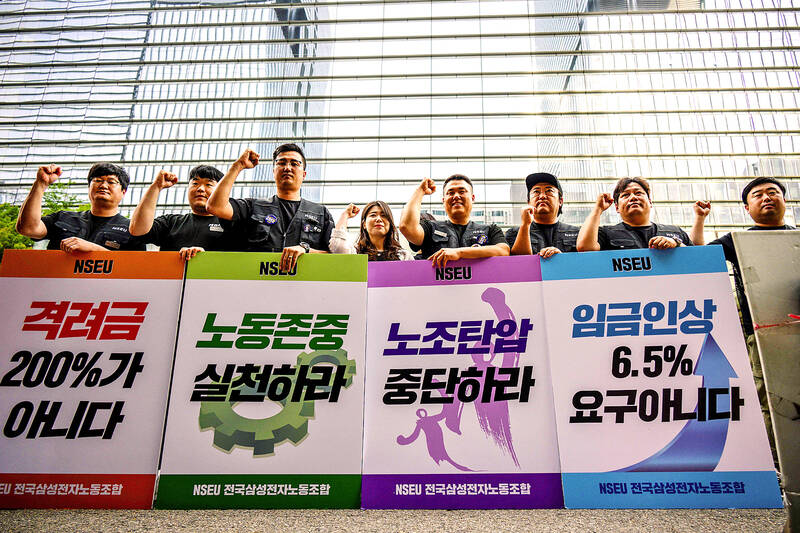The largest union at Samsung Electronics Co went on a strike for the first time in the company’s 55-year history, with the standoff over pay so entrenched that the two sides have stopped all discussions.
The National Samsung Electronics Union, the largest of the tech giant’s several unions with about 28,400 workers, encouraged members to take a single day off yesterday, which fell between a Thursday public holiday and the weekend. They plan to resume normal work hours next week.
“This is a soft start and a symbolic move,” union deputy secretary-general Lee Hyun-kuk told Bloomberg News. “But we have plans for subsequent strikes if the management refuses to communicate. We are not ruling out an all-out general strike.”

Photo: AFP
Union leaders gathered yesterday in front of Samsung’s office building in Seoul, with one speaking to a local television station. A bus draped in an enormous white protest banner was parked at the site. Placards carried worker appeals, but the crowd was largely muted.
That contrasts with violent walkouts at carmakers that were common in South Korea in the past. In 2009, workers at Ssangyong Motor Co took control of a plant for months, using iron pipes and Molotov cocktails to battle police armed with tear gas and water cannons.
At the heart of the dispute now are bonus payments for Samsung laborers. Workers in the company’s semiconductor division did not receive such extra payments last year, when the unit lost about 15 trillion won.
They fear they might not get bonuses again this year even if the division returns to profit, said union leader Son Woo-mok.
Samsung calculates workers’ bonuses with a complex formula that deducts its cost of capital from operating profit, adjusted for taxes on a cash basis.
The union is asking the company to simply use operating profit like some of its peers — or to be much more transparent in how it determines those numbers, union leaders said.
Historically, bonuses make up a significant portion of a worker’s pay, so missing out on such money can mean a meaningful reduction in compensation.
The dispute is really about whether Samsung would prioritize profits for shareholders or contributions from workers, said Kwun Seog-kyeun, a former business school professor at Hankuk University of Foreign Studies.
“The company has been, and will continue to be, in good faith in negotiations with the union,” Samsung Electronics said in a statement, adding that there has been no impact on production or management activities.
It also said the number of workers off yesterday is less than the comparable day last year.
Samsung’s labor management council in March said they would increase this year’s pay by 5.1 percent after narrowing their differences over several rounds of negotiations. The company has historically set pay increases through a council consisting of representatives from both sides.
However, the agreement was called off in the most recent talks, because management did not agree to an additional paid day off they demanded, union leaders said.
“This strike will not impact DRAM and NAND flash production, nor will it cause any shipment shortages,” Taipei-based market researcher TrendForce Corp (集邦科技) said in a report last week.

Vincent Wei led fellow Singaporean farmers around an empty Malaysian plot, laying out plans for a greenhouse and rows of leafy vegetables. What he pitched was not just space for crops, but a lifeline for growers struggling to make ends meet in a city-state with high prices and little vacant land. The future agriculture hub is part of a joint special economic zone launched last year by the two neighbors, expected to cost US$123 million and produce 10,000 tonnes of fresh produce annually. It is attracting Singaporean farmers with promises of cheaper land, labor and energy just over the border.

US actor Matthew McConaughey has filed recordings of his image and voice with US patent authorities to protect them from unauthorized usage by artificial intelligence (AI) platforms, a representative said earlier this week. Several video clips and audio recordings were registered by the commercial arm of the Just Keep Livin’ Foundation, a non-profit created by the Oscar-winning actor and his wife, Camila, according to the US Patent and Trademark Office database. Many artists are increasingly concerned about the uncontrolled use of their image via generative AI since the rollout of ChatGPT and other AI-powered tools. Several US states have adopted

A proposed billionaires’ tax in California has ignited a political uproar in Silicon Valley, with tech titans threatening to leave the state while California Governor Gavin Newsom of the Democratic Party maneuvers to defeat a levy that he fears would lead to an exodus of wealth. A technology mecca, California has more billionaires than any other US state — a few hundred, by some estimates. About half its personal income tax revenue, a financial backbone in the nearly US$350 billion budget, comes from the top 1 percent of earners. A large healthcare union is attempting to place a proposal before

KEEPING UP: The acquisition of a cleanroom in Taiwan would enable Micron to increase production in a market where demand continues to outpace supply, a Micron official said Micron Technology Inc has signed a letter of intent to buy a fabrication site in Taiwan from Powerchip Semiconductor Manufacturing Corp (力積電) for US$1.8 billion to expand its production of memory chips. Micron would take control of the P5 site in Miaoli County’s Tongluo Township (銅鑼) and plans to ramp up DRAM production in phases after the transaction closes in the second quarter, the company said in a statement on Saturday. The acquisition includes an existing 12 inch fab cleanroom of 27,871m2 and would further position Micron to address growing global demand for memory solutions, the company said. Micron expects the transaction to